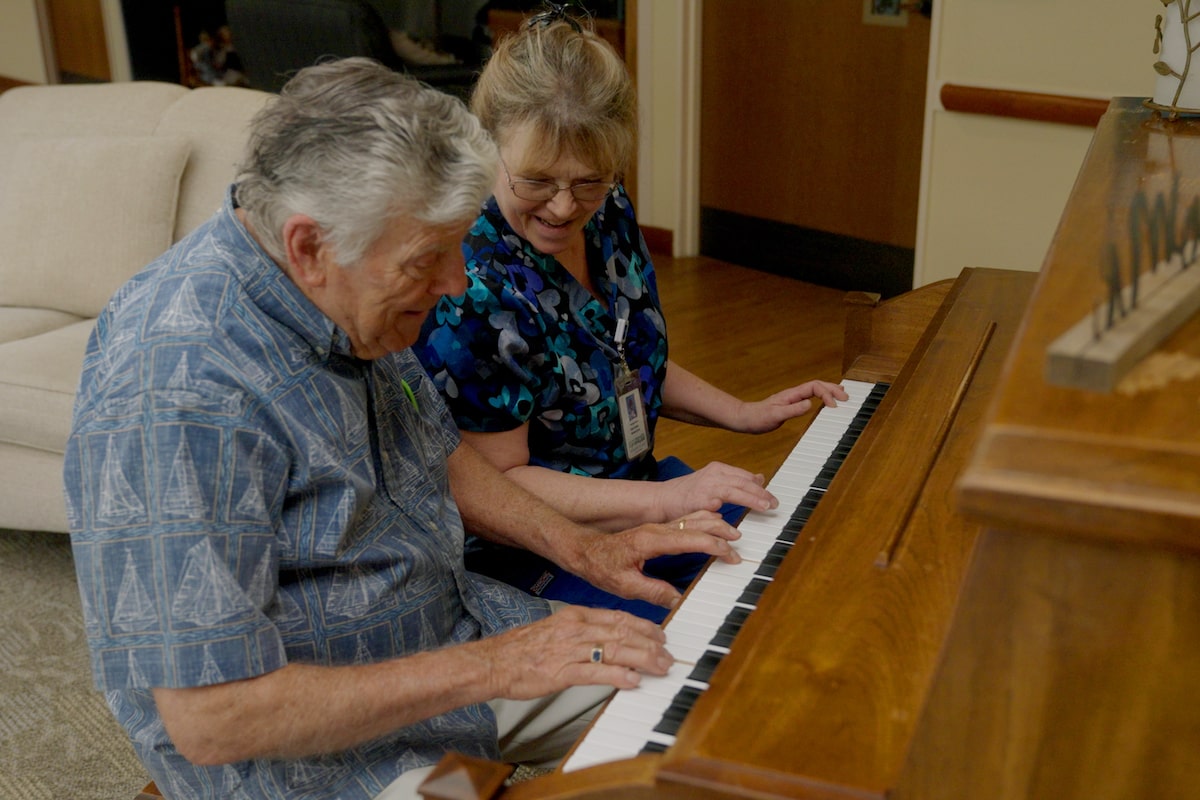Assisted Living and Nursing Homes: What’s The Difference?

In the past, the term “nursing home” was used to describe any type of senior care. However, over the years, senior care and senior living communities have evolved to offer varying levels of support, housing, and lifestyle options. From 55+ neighborhoods to skilled nursing and rehab, older adults have more choices than ever when it comes to living a fulfilling lifestyle.
Of all these lifestyle options, two are still commonly confused: assisted living and nursing homes. While it’s true that these are similar in many ways, they also differ in crucial ways.
Uplands Village is a Life Plan Community in Pleasant Hill, Tennessee, offering all options for senior care—from independent living to long-term care and everything in between. We’re taking a closer look at two of our lifestyle options—assisted living and skilled nursing—and sharing the similarities and the differences to help you and your family find the level of care and support.
Understanding the Term: Nursing Home
Before we go into the differences between nursing homes and assisted living, it’s helpful to understand today’s terminology. While some people still refer to any senior living community as a nursing home, they are more commonly known as skilled nursing facilities (SNFs).
Skilled nursing may also be referred to as long-term care since most residents at SNFs live with a progressive illness or require specialized medical attention that cannot be delivered at an assisted living community. At Uplands Village, we offer long-term care and support in our on-campus Wharton Homes.
How Assisted Living and Long-Term Care Differ
Care and Support
ASSISTED LIVING: Assisted living communities are designed for individuals who need some support with activities of daily living (dressing, bathing, mobility, or medication management) but may be otherwise independent and active. Assisted living communities aim to help residents maintain their independence, providing assistance when it’s needed, but encouraging them to be as independent and self-directed as much as possible or desired.
LONG-TERM CARE: Skilled nursing and long-term care are for those who need more dedicated care and attention. Residents of long-term care facilities typically need round-the-clock monitoring and usually have more complex medical conditions that require the assistance of a licensed medical professional. These individuals could be living with a chronic illness or recovering from an acute medical complication, like surgery or a stroke.
Environment and Layout
ASSISTED LIVING: Since assisted living communities aim for independence, they are more home-like and create a community-driven atmosphere. Residents of assisted living typically live in their own private residences but have the opportunity to connect in common areas, programs, activities, and dining. Of course, residents can also take advantage of their privacy and choose to spend time or cook in their apartments.
LONG-TERM CARE: While most skilled nursing facilities aim to create the same comfortable and welcoming feel, they do offer more medical-based care, so they might exude a more clinical setting. Many residents of long-term care homes have difficulty with mobility, which can result in less movement about the space.
Paying for Care
ASSISTED LIVING: Unfortunately, Medicare does not cover the costs associated with assisted living, so residents typically pay out-of-pocket for these services. However, other resources are available that may be able to help cover these costs, including long-term health insurance, VA benefits, an annuity, and other aids.
LONG-TERM CARE: On the other hand, Medicare does cover some stays in skilled nursing facilities, depending on the length of stay and further coverage details. Some individuals only use skilled nursing services on a short-term basis, which Medicare fully covers. However, it may not cover anything longer than a 20-day stay.
How Assisted Living and Long-Term Care Are Similar
While there are many differences, there are also some similarities between these two types of care. At their core, they both exist to serve and support individuals who need an additional layer of support. In addition, they both provide conveniences like daily meals and housekeeping services, as well as meaningful enrichment activities that enhance the body, mind, and spirit.
Assisted Living at Uplands Village
At Uplands Village, our assisted living options create a life of comfort, choice, and care, allowing residents in Pleasant Hill, Tennessee, to live fully and intentionally. Our Fletcher House offers private apartments for each resident, as well as conveniences like housekeeping, exercise classes, an on-site health clinic, activity rooms, and cozy gathering spaces. We are also led by the philosophies of the Eden Alternative®, which ensures each resident is making their own decisions regarding their care and their days.
Long-Term Care at Uplands Village
Just down the street from Fletcher House is our long-term care campus, Wharton Homes. Wharton Homes is separated into four intimate home-like settings, eliminating the institutional feel of a hospital. Like assisted living, our long-term care residents enjoy daily meals, housekeeping, and life enrichment, with the addition of 24/7 personal care.
To discover which level of care could be right for your parent or older family member, read our blog, “Explore Senior Living & Find the Right Lifestyle and Care Option for You.”
Finding the Right Care at Uplands Village
While assisted living and nursing homes have some differences, they both offer dedicated, professional, and intentional care. Some individuals may end up receiving care from both of these types of communities at some point in their lives, and at Uplands Village, we make that possible. As a Life Plan Community, we offer a continuum of living options to meet each individual’s needs wherever they may be.
Visit our website today to discover more about Uplands Village and our Fletcher House and Wharton Homes in Pleasant Hill, Tennessee.

